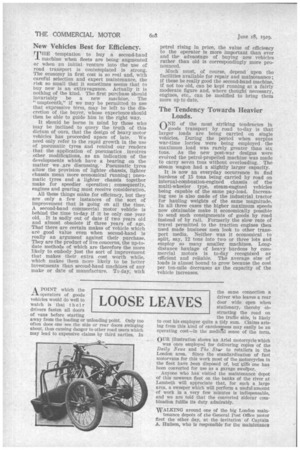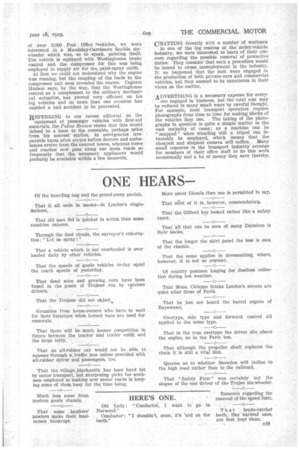A POINT which the operators of goods vehicles would do well
Page 80

Page 81

If you've noticed an error in this article please click here to report it so we can fix it.
to watch is that their drivers fasten all doors of vans before starting away from the loading or unloading point. Only too often does one see the side or rear doors swinging about, thus causing danger to other road users which may lead to expensive claims by third parties. In the same connection a driver who leaves a rear door wide open when stationary, thereby obstructing the road on the traffic side, is likely to cost his employer quite a tidy sum. Claims arising from this kind of carelessness may easily be an operating cost—in the medial sense of the term.
OUR illustration shows an Ariel motorcycle which was once employed for delivering conies of the Daily News and The Stair to retailers in the London area. • Since the standardization of fast motorvans for this work most of the motorcycles in the fleet have been disposed of, but' thib One has been converted for use as a garage sweper.
Anyone who has visited the maintenance depot of this newsvan fleet on the banks of the river at Lambeth will appreciate that, for such a large area, a sweeper which will perform a useful amount of work in a very few minutes is indispensable, and we are told that the converted sidecar combination fulfils its duty admirably.
WALKING around one of the big London maintenance depots of the General Post Office motor fleet the other day, at the invitation of Captain A. Hudson, who is responsible for the maintenance of over 2,000 Post Office 5vehicles, we were interested in a Maudslay-Carrimore flexible sixwheeler which was, so to speak, painting itself. The vehicle is equipped with Westinghouse brake control and the compressor for this was being employed to supply air for the paint-spray outfit At first we could not understand why the engine was running, but the coupling of the leads to the compressor unit soon revealed the reason. Captain Hudson says, by the way, that the Westinghouse control as a complement to the ordinary mechanical actuation, has proved very efficient on his big vehicles and on more than one occasion has enabled a bad accident to be prevented.
REFERRING to our recent editorial on the equipment of passenger vehicles with first-aid materials, the Police Review states that this would indeed be a boon to the constable, perhaps miles from his nearest station. In emergencies irreparable harm often occurs before doetors and ambu lances arrive from the nearest towns, whereas buses and coaches now pass along our main roads so frequently that the necessary appliances would probably be available within a few moments., CHATTING recently with a number of workmen in one of the big centres of the naotOr-vehicle_ industry, we were interested to learn of their concern regarding the possible removal of protective duties. They consider that such a procedure would be bound to cause unemployment in the industry. It so happened that the men were engaged in the production of both private cars and commercial vehicles, but they seemed to be unanimous in their views on the matter.
ADVERTISING is a necessary expense for every one engaged in business, but the total cost may be reduced in many small ways by careful thought. For example, most transport operators require photographs from time to time for making blocks of the vehicles they use. The taking of the photographs in question is quite a simple matter in the vast majority of cases; as a machine can be "snapped" when standing still a tripod can invariably be employed, which means that the cheapest and simplest camera will suffice. Many small concerns in the transport industry arrange for members of their office staff to do this work occasionally and a lot of money they save thereby.








































































































































































































